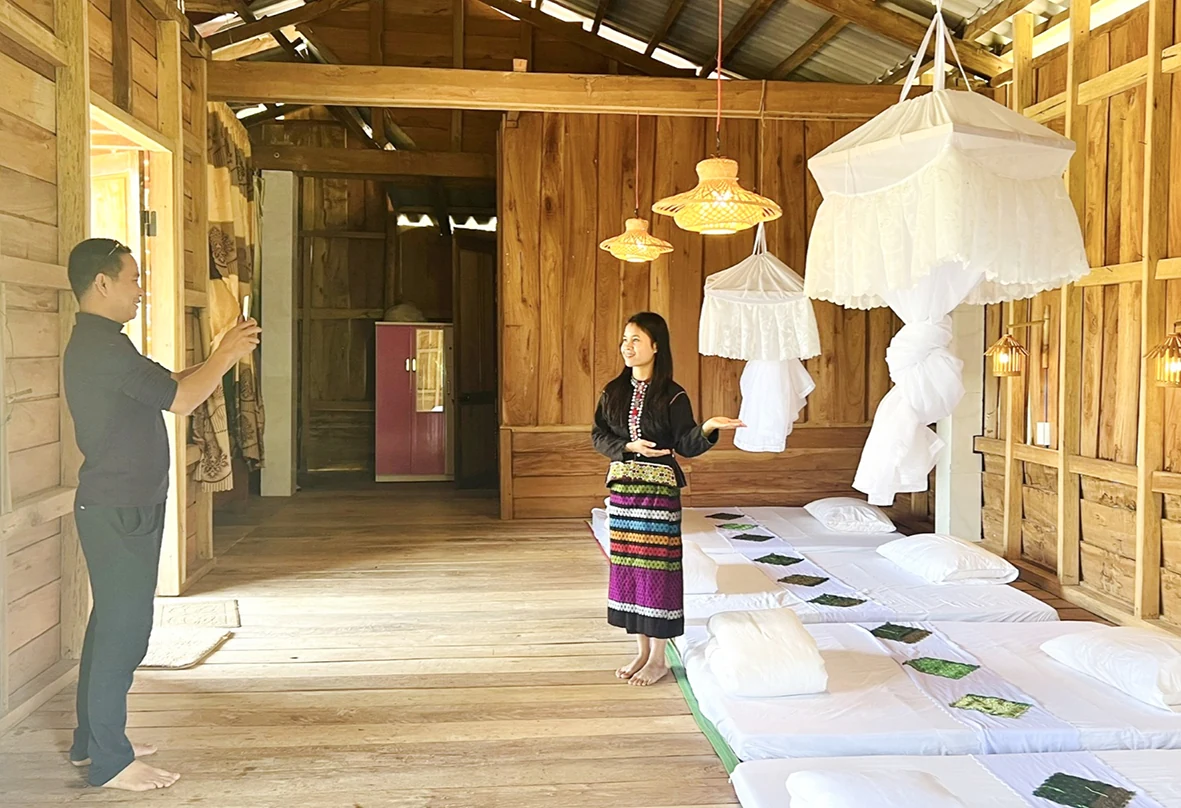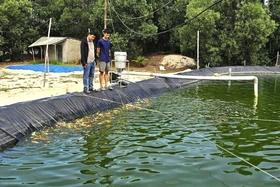{title}
{publish}
{head}
Implementing the criteria and targets on culture, sports, and tourism under the National Target Program on New Rural Development for the 2021–2025 period, Quang Tri province has recently focused on mobilizing resources to build and complete a system of cultural and sports facilities from the provincial to grassroots levels that are increasingly spacious and modern, meeting the political, cultural, and spiritual needs of all classes of people. The program has created a positive effect, promoting cohesion and leveraging the results of building new rural areas and a civilized urban lifestyle in the locality.
To ensure the practical effectiveness of the National Target Program on New Rural Development during this period, the Department of Culture, Sports and Tourism has issued documents, directives, and guidelines for implementing the criteria of the new rural program. Among them, there is a focus on promoting the movement “All people unite to build a cultural life” in connection with new rural development and civilized urban areas; preserving and promoting traditional cultural values in a sustainable and multi-valued manner at the local level.

Ho Thi Thiet, owner of a homestay tourism model in Chenh Vanh village, Huong Phung commune, promotes tourism on social media platforms. Source: N.T
Notably, the department has coordinated with the Department of Agriculture and Environment, relevant units and organizations, localities, and non-governmental organizations to implement and survey current conditions, connect businesses, enhance community capacity, and support infrastructure and equipment for several sites with potential for agricultural and rural tourism development, such as: Khe Luoi, Mo O commune; Ta Lao stream, Pa Cha stream, Ta Long commune; Klu tourist area, Dakrong commune (Dakrong district); Chenh Vanh eco-tourism village, Huong Phung commune; Ta Puong waterfall, Huong Viet commune (Huong Hoa district)...
Support has been provided in terms of equipment, landscape improvement, and tourism professional training for Chenh Vanh eco-tourism village and Ta Puong waterfall. A television program has been developed focusing on rural tourism development associated with the implementation of the One Commune One Product Program. In collaboration with the Project on Sustainable Forest Management and Biodiversity Conservation (VFBC), training was provided to 38 participants through hands-on famtrip activities and integrated landscape consulting sessions. A famtrip was organized in Huong Hoa district with the participation of 30 representatives from travel businesses and the Vietnam Community Tourism Association.
At the same time, planning work has been given attention, with projects such as the 1/2000 scale subdivision planning of tourist zones being implemented to facilitate the attraction of social resources to invest in tourism development. Capital has been allocated for the investment project to develop a typical tourist destination in Klu village, Dakrong commune, sourced from the National Target Program on Socio-Economic Development in Ethnic Minority and Mountainous Areas for the 2021–2025 period, with an investment cost of 6.915 trillion VND (approximately US$271.33 million).
Surveys and assessments of the current status of rural tourism sites under the new rural development program have been carried out throughout the province. At the same time, guidance has been provided for community-based ecotourism destinations such as Tra Loc (Hai Lang district), Gio An commune (Gio Linh district), Chenh Vanh village, Ru Linh ecotourism area, and the Dfarm Quang Tri high-tech organic agricultural ecotourism site...
The system of cultural and sports facilities at the grassroots level has been gradually invested in to become more modern and spacious. As of April 30, 2025, the entire province has 540 out of 799 villages and residential groups meeting cultural standards; 167,453 out of 175,142 households meeting cultural family standards; 25 out of 95 communes, wards, and towns recognized as exemplary; 7 out of 24 wards and towns meeting civilized urban standards; and 78 out of 95 communes, wards, and towns with standard cultural-sports centers. There are 779 out of 799 villages and neighborhoods with cultural houses and sports zones, of which 454 out of 779 meet the standards.
Regarding the results of the new rural development program (in the areas of culture, sports, and tourism), at the commune level, based on individual criteria, 69 out of 95 communes have met criterion number 6 on cultural infrastructure; 69 out of 95 communes have met criterion number 16 on culture. In terms of the national criteria set for advanced new rural communes, 21 out of 69 communes have met criterion number 6 on culture; 21 out of 69 communes have met indicator 13.7 (promotion of local tourism image through Internet and social media applications).
At the district level, according to the national criteria set for new rural districts, 5 out of 8 districts have met criterion number 5 on health, culture, and education. Under the advanced national criteria for new rural districts, 1 district has met criterion number 5 on health, culture, and education.
In terms of overall new rural development results, as of now, 4 districts in the province have been recognized as meeting the new rural standards (Cam Lo, Vinh Linh, Trieu Phong, Hai Lang), and 69 out of 95 communes have met the new rural commune standards, of which 21 communes have achieved advanced new rural status.
However, the implementation of the program still faces certain difficulties and limitations. In the coming time, the Department of Culture, Sports and Tourism will continue to closely coordinate with communes that have rural tourism sites to promote the completion of rural tourism development objectives within the framework of sustainable and effective new rural development.
This includes focusing on investment in construction and upgrading of infrastructure, enhancing training and capacity building on specialized knowledge in rural tourism management for government management staff from the provincial to local levels. Investment support will be provided for the preservation of ethnic cultural identity and for promoting the value of heritage and scenic sites to support tourism development.
Rural tourism development must be associated with agriculture and rural areas to build a system of distinctive, diverse, high-value, and high-quality products based on local natural and cultural factors to attract tourists.
There will be continued priority given to developing target markets with large tourist volumes and high proportions, particularly in Southeast Asian countries, with a main focus on Thailand, Laos, and countries along the East–West Economic Corridor.
Continued attention will also be given to investing in the construction of cultural, sports, and recreational facilities at newly merged commune- and ward-level administrative centers, ensuring that the infrastructure meets the standards to serve the political and cultural activities of local communities. There will be a focus on directing new rural development efforts in remote, isolated, and border areas to shorten the gap in cultural enjoyment between different regions.
Kan Suong - Ngoc Mai

QTO - In Quang Tri, clean agricultural stores may not flaunt flashy signs or wide storefronts, but they are quietly becoming trusted places where consumers...

QTO - In a quiet village in central Vietnam, Le Minh Duc, 26, has turned his passion for ornamental fish into a promising startup, the first Koi breeding...